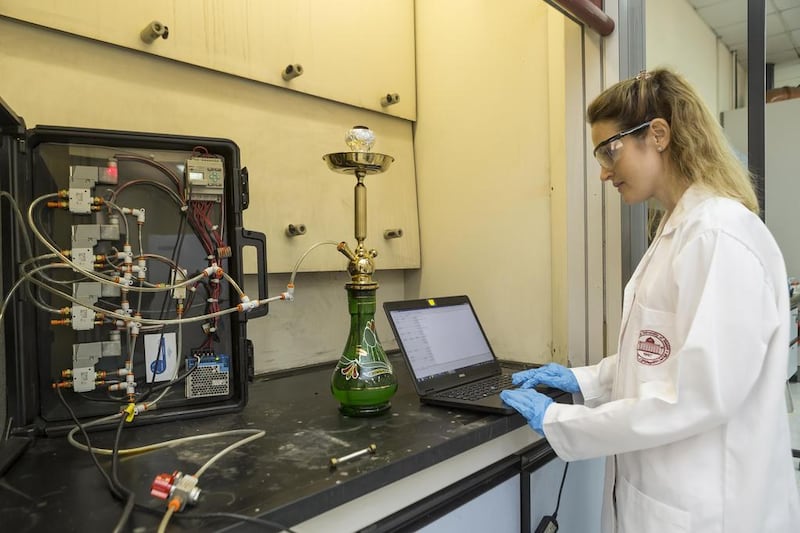SHARJAH // Researchers have found that dangerous toxins from shisha and dokha fumes can lead to “hookah sickness” or even seizures.
A machine is helping researchers at the American University of Sharjah to identify toxic chemicals in the fumes, and prove that smoking shisha poses more health risks than using cigarettes.
Hookah sickness can include light-headedness, headaches and chest pain.
Researchers used the machine to simulate a person smoking under controlled conditions. They found traces of iron, lead, cadmium, chromium, cobalt and manganese at concentrations similar to or higher than those in cigarettes.
“There is plenty of evidence to support how harmful shisha is, with several cases of death being reported worldwide as a result of intoxication after shisha smoking,” said Dr Yehya El Sayed, associate professor of biology, chemistry and environmental sciences.
Academics found a link to seizures among regular smokers of shisha or dokha because of the effect on the central nervous system.
Very high concentrations of nicotine and cases of carbon-monoxide intoxication have also been reported, and some shisha smokers suffered hookah sickness.
Experts believe that charcoal briquettes are one of the major contributors to toxicity, but their composition and effect on the smoke generated remain largely unknown.
The researchers studied seven patients with a history of seizures that arose from smoking medwakh. Six of them suffered no further seizures after they quit smoking.
“There have been several cases reported in the UAE of seizures after smoking too much, and others reported around the world,” said Dr El Sayed.
“We have data under collection of seizure cases at coffee shops and others admitted to hospitals.”
The research identified depressants associated with various symptoms that shisha and dokha users reported. These symptoms include dizziness, loss of coordination, nausea, unconsciousness, fatigue, drowsiness, tension and perspiration. Smokers also reported irritation of the eyes, skin, nose, and the gastrointestinal and respiratory tracts.
“Some people think that shisha is safe and in some cases even healthy,” said Dr Julio Gomez, a pulmonologist at NMC Hospitals.
“We know it is worse than cigarettes because it involves inhaling the associated chemicals around combustion.
“Users actually inhale more fumes. It is similar to smoking 90 cigarettes continuously, so it is very dangerous.”
Dr Gomez said shisha might be less addictive but it posed the same health risks as cigarettes.
“It can worsen chronic bronchitis and asthma symptoms. Vascular problems associated with tobacco products can also lead to problems with the brain, and seizures,” he said.
Cancer is the third leading cause of death, accounting for 16 per cent of deaths, and lung cancer is most common among men, Health Authority Abu Dhabi figures show.
Lung cancer is the most common form of cancer among Emirati men, 23 per cent of whom are smokers, according to City Hospital in Dubai.
A 100 per cent excise duty on tobacco will be introduced in the UAE this year, and prices of tobacco products will double across the GCC.
Further warnings are required to deter young people from smoking shisha, which doctors view as a gateway to using cigarettes.
“Cigarettes are available and affordable in the UAE but shisha seems more acceptable,” said Dr Saheer Sainalabdeen, a specialist pulmonologist at International Modern Hospital.
“Most people are unaware of the toxic ingredients of shisha. They do more damage than cigarettes and more people are likely to develop respiratory problems.”
nwebster@thenational.ae






